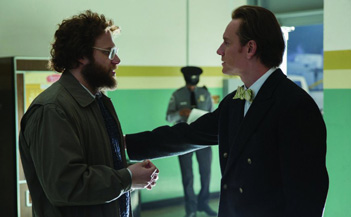The 400-Word-Review: Steve Jobs
By Sean Collier
October 26, 2015
BoxOfficeProphets.com

It is a very good bad movie.
No typo there — Steve Jobs is, at its core, a bad movie. It is a drawn-out and patently frivolous ode to a figure who should’ve instead been deconstructed and demystified, saddled with a structure that defies everything the film is telling us about its central character.
It might still win some Oscars. Good bad movies do that from time to time.
The entirety of Steve Jobs takes place in three long scenes, each backstage before a major product launch: the debut of the original Macintosh computer in 1984, the introduction of the doomed NeXT PC in 1988 and the fevered rollout of the iMac in 1998. With mere minutes to go before his most visible professional moments, Jobs (Michael Fassbender) argues with staff and family about his worth as a co-worker, a father and a human being.
Let’s pause right now: I know it’s a movie, but this is inherently absurd. Babe Ruth didn’t argue with the mother of his children in the locker room before World Series games, Roosevelt didn’t debate strategy with Churchill before a State of the Union address and Steve Jobs didn’t reopen old wounds with Steve Wozniak before introducing the most disruptive computing technology of the 21st century. It’s a trope that might function in a speculative theatrical piece but is little more than irritating on the screen.
Fortunately, Sorkin’s dialogue sparkles and Boyle’s direction makes these potentially-languid scenes charged and vivid. The cast is deserving of the accolades that are headed their way, Fassbender especially; as of this writing, he is perceived as the front-runner for the season’s top acting prizes, and there will be no crime in that. His performance is dazzling.
The true drag, though, lies in the unnecessary deification of Jobs here, even as the text exposes his many flaws. An unflinching biography would’ve been illuminating; the forced mythmaking here is cloying. Perhaps there’s a better descriptor here than “good bad movie.” Steve Jobs is a good movie but a dumb project.
My Rating: 6/10